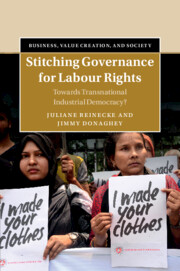Book contents
- Stitching Governance for Labour Rights
- Business, Value Creation, and Society
- Stitching Governance for Labour Rights
- Copyright page
- Contents
- Figures and Tables
- Foreword
- Foreword
- Acknowledgements
- Abbreviations
- 1 Introduction
- 2 The Democratic Deficit of Global Supply Chains
- 3 Democratic Representation
- 4 After Rana Plaza
- 5 Representative Alliances in the Creation of the Bangladesh Accord
- 6 Creating Representation through Industrial Democracy versus CSR
- 7 When Transnational Governance Meets National Actors
- 8 Building Representative Structures at the Workplace Level
- 9 Conclusion
- Book part
- References
- Index
6 - Creating Representation through Industrial Democracy versus CSR
The Accord and Alliance as a Natural Experiment
Published online by Cambridge University Press: 09 March 2023
- Stitching Governance for Labour Rights
- Business, Value Creation, and Society
- Stitching Governance for Labour Rights
- Copyright page
- Contents
- Figures and Tables
- Foreword
- Foreword
- Acknowledgements
- Abbreviations
- 1 Introduction
- 2 The Democratic Deficit of Global Supply Chains
- 3 Democratic Representation
- 4 After Rana Plaza
- 5 Representative Alliances in the Creation of the Bangladesh Accord
- 6 Creating Representation through Industrial Democracy versus CSR
- 7 When Transnational Governance Meets National Actors
- 8 Building Representative Structures at the Workplace Level
- 9 Conclusion
- Book part
- References
- Index
Summary
Chapter 6 explores in greater detail why transnational industrial democracy yields a different approach to labour governance by presenting a structured comparison between the Bangladesh Accord for Fire and Building Safety (the Accord) and the Alliance for Bangladesh Worker Safety (the Alliance). The latter was a parallel initiative set by 29 mainly North American retailers and operated as an alternative to the Accord, but was more firmly rooted in a CSR approach. Private governance as a whole has been characterised by competition between overlapping initiatives which often claim to have the same objectives but differ in their institutional design and governance. The Accord and the Alliance reflect these differences. By considering differences and similarities in the design and implementation of these two competing initiatives, this chapter demonstrates how differences in institutional design and governance translate into distinct emphases in implementation. In particular, we find that the inclusion of worker representatives in the design of transnational governance structures leads to the recognition of divergent interests and hence to a more rigorous model of transnational labour governance.
Keywords
- Type
- Chapter
- Information
- Stitching Governance for Labour RightsTowards Transnational Industrial Democracy?, pp. 119 - 145Publisher: Cambridge University PressPrint publication year: 2023



